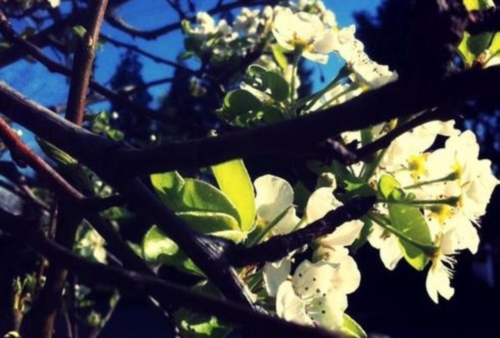Start with a dilapidated but cheap house. Move there under duress perhaps, maybe because it’s cheaper or because you need safe haven from things that are harming you. Make sure the tree is there, in front where it can greet you with low branches, and soften the sun’s glare with its canopy. It must be really big and full of blossoms when you pull up with your moving trucks containing everything you value. It has to have been there awhile, it must have witnessed families come and go before yours.
The house should get abundant shade from that tree. This must be a sort of house that is old and has no air conditioning, a house where you throw open the windows on the first hot day after you arrive and welcome the outdoors in, and even where there are no screens, you tolerate the bug visitors because you can smell your tree and feel the breeze and its comfort. There is no hum of a machine to cool you, only the shouts of neighbors and the bugs and this tree, and a wide open front door.The blossoms need to fall, the way blossoms do when the fruit is on its way, and you should probably feel surprised at the beauty of the carpet of petals that densely covers your porch and front walk. You remember the days that petals on your car would bother you in spring, the way they would cling to your window shield after a rain and get caught in the wipers and then rot. But these are petals, and they’re beautiful, and they’re causing you no problems, even when the children track them in on their shoes.

When the apples start to fall, they’re green and bitter and they get smashed on the street out front. Bees and flies flutter around the pulp, and neighbors kick the crushed ones back toward your yard with some irritation. This is the work, this is where it starts. The same irritable neighbors come over periodically and help you manage this early growth, irritation is softened, and you climb branches and shake the trunk and all of you laugh at the hail storm of new fruit when it hits the ground with a knocking sound and rolls around like ball bearings, making you stumble like you’re already drunk on its fermentation.
Create games on the fly. Start keeping score: who can pitch the most apples into the compost bin, without missing? Have a running tally with the guy across the street that goes on for days; shout your number with a challenging tone. Welcome the gardening couple who have no children and have time to read about what to do for the tree, let them help you prune and cull and fertilize with compost tea.
Provide beer. Sit on the porch and chat.
And when there have been some days when too many have fallen and there are too many frustrations, go gather. Make the kids do it when your back goes out. There’s always more. Pile what isn’t salvageable into baskets and dump it into the chickens’ feed bin, and stop and spend some time watching them bob their heads and dart their beaks into the crunchiest sections, leaving the mush for you to rinse out later.
What you have gathered is good but needs care. First there’s the washing—be thorough—and then of course much coring and chopping. Leave the peel on, and put the pieces through a juicer. There will be a lot of foam on the top, and it might be too tart for the children at first. Pour it through a strainer and sweeten it slightly with honey or maple syrup.
Then you must strain again. You need to rid yourself of the bitter foam and remember the delicate beauty of those blossoms when the tree greeted you. You need to do the work and make it right, make the sweetness linger on the tongue, soften the sharpness of too much disappointment that led to this bushel of fruit that must be processed in order to nourish you. You freeze some for the long winter that seems far away but that’s really right around the corner, when the tree is bare and scratching against gunmetal skies, relentlessly holding its arms out and waiting for the spark of light to return. Those are hard months and you will miss this sweetness.
It’s bound to be surprising, how many tart little apples it takes to make a quart of golden juice that makes the children smack their lips and stop what they’re doing to savor. You pour it out in measured doses so it’s not taken for granted. Each mouthful contains some small story of the year that’s passed.









